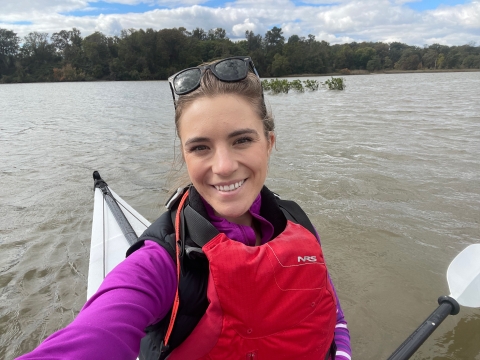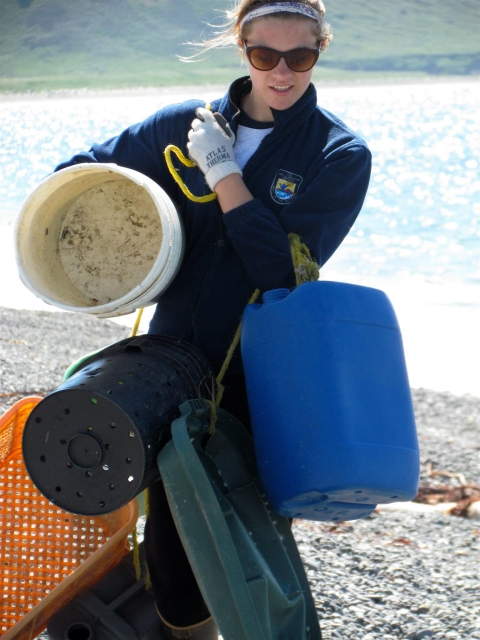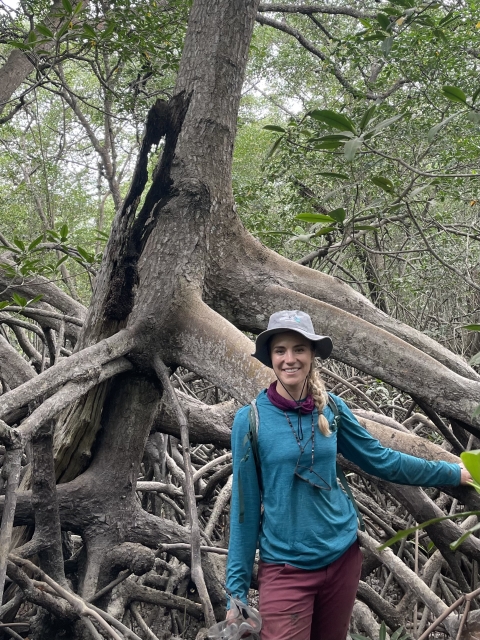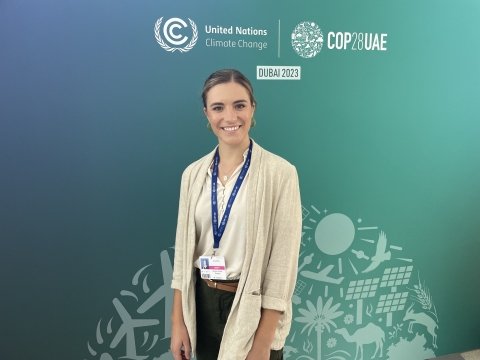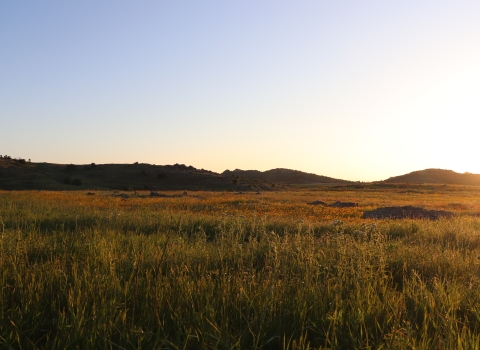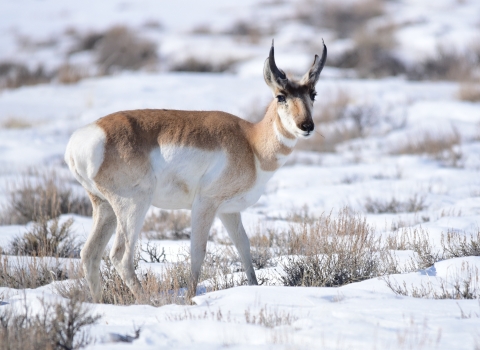My name is Anelise Zimmer, and I am from Kodiak, Alaska. Kodiak was a very special place to grow up because of the tight-knit community and world-class natural environment. My childhood in Kodiak and the experiences I had subsistence fishing and adventuring outdoors with my mom, dad, and brother shaped me into the person I am today.
I was fortunate to be exposed to the Kodiak National Wildlife Refuge’s environmental education programs from a very young age. I participated in Families Understanding Nature (FUN) when I was a toddler and attended Salmon Camp every summer until I was too old to attend. Salmon Camp was my favorite part of summertime in Kodiak, and I loved learning about nature and science through art and games with my friends. In high school, I volunteered at Salmon Camp with the Kodiak Refuge Youth Leadership (KRYL) program. Through that program, I began to learn about various environmental careers. The summer after I graduated from high school, I worked as a Youth Conservation Corps (YCC) crew member, and the next summer I returned as the crew leader. After I graduated from college, I came back again to work as the YCC crew leader for a second season.
The lasting impact of participating in Youth Conservation Corps
Participating in YCC defined the trajectory of my life. As a high school student I was, as many high school students are, unsure of what I wanted to do with my life. During the summer between high school and college when I was a YCC crew member, my uncertainty transformed into a strong sense of purpose: environmental conservation.
YCC provided me with role models from the variety of career paths one can pursue within conservation, including environmental education, biological research, and the human dimensions of conservation. Through YCC, I had the chance to ask these role models (the amazing Kodiak Refuge staff members that YCCers get to interact with during their summers) about their life paths. One thing I observed from these mentors is that there were more pathways to enact positive environmental change and have a fulfilling career than I initially realized. I also saw that they spent a lot of time outdoors doing activities they loved with other interesting and passionate people, which to me, seemed like a no brainer for how I wanted to spend my time.
In addition to giving me a clearer view of various career options, YCC provided me with paid work experience in which I learned new skills including research, communication, and the art of making difficult field work –such as invasive species invasive species
An invasive species is any plant or animal that has spread or been introduced into a new area where they are, or could, cause harm to the environment, economy, or human, animal, or plant health. Their unwelcome presence can destroy ecosystems and cost millions of dollars.
Learn more about invasive species removal, outhouse maintenance, or cleaning marine debris off a remote beach– fun. Because of YCC, I also learned about the ecological and chemical intricacies of nature, which provided me with a useful baseline while enrolled in undergraduate biology and chemistry courses.
I want to emphasize not only the importance of the opportunity YCC provides to be trained in new skills and meet role models, but also the opportunity to do so while being paid. Environmental conservation is a notoriously difficult career path to enter because there are limited paid entry-level opportunities, and many people rely on unpaid internships to gain the skills they need for future employment. Due to this barrier, the environmental field is not as diverse as it should or could be. Paid programs, like YCC, that provide entry-level job training play a critical role in preparing the future of the environmental workforce and diversifying the field so that our environmental solutions are more innovative and help more people and ecosystems along the way. In high school, I never imagined that I would be a woman in a STEM career, but YCC helped make that possible.
In the two summers that I worked as the YCC crew leader, I not only built upon all the skills I learned as a YCC crew member, but also had the chance to sharpen my leadership skills. Thanks to the guidance and patience of my supervisor, Shelly Lawson, I learned how to manage a team, communicate expectations, and respond to difficult situations. Shelly’s leadership style also encouraged me to embrace the wide range of personalities that can exist on a team and to be patient and adaptable when experiences don’t go as planned. Thanks to YCC, I’m a more empathetic and communicative leader.
A lot has changed in my life since I participated in YCC, and it is grounding to be able to reflect and pinpoint YCC as such a specific, positive experience that provided me with an unwavering sense of career motivation and that allows me to wake up every morning and feel glad about what I get to do for work.
Youth Conservation Corps as a career kick-starter
After that fateful summer as a YCC crew member, I attended Willamette University, where I majored in environmental science and minored in politics. After graduating with my bachelor’s degree, I spent my second summer as the YCC crew leader in Kodiak before moving to Malaysian Borneo for a year to teach English through a Fulbright grant with the U.S. State Department. Upon returning to the U.S., I moved to Seattle, Washington and managed Ocean Beauty Seafoods’ environmental programs before attending graduate school at Yale University. At Yale, I earned a Master of Environmental Management and specialized in coastal conservation and international climate policy.
I moved to Washington, DC two years ago and I work on coastal wetland conservation and international climate policy at The Pew Charitable Trusts. At Pew, I support the development and implementation of science-based climate policies that support the management and conservation of coastal wetland ecosystems (mangrove, saltmarsh, and seagrass) in the regions of Latin America, the Caribbean, and East Africa. I love my current international-facing work but dream of someday returning to work on conservation issues closer to Alaska.
In December 2023 I attended COP28, the United Nations climate change climate change
Climate change includes both global warming driven by human-induced emissions of greenhouse gases and the resulting large-scale shifts in weather patterns. Though there have been previous periods of climatic change, since the mid-20th century humans have had an unprecedented impact on Earth's climate system and caused change on a global scale.
Learn more about climate change conference in Dubai. While there, I went to an event that was focused on youth and climate action. The panelists were several countries’ Ministers of the Environment and a few youth climate delegates. The panelists were posed the question: what is the responsibility of youth to act on climate change? The conversation was tense. The Ministers accused the youths of being apathetic and uninterested in learning from their elders. The youths countered saying that they were doing everything they could within their power to make a difference, but that the adults were not equipping them with the opportunities and skill sets to enact the level of change they desired.
This panel discussion compelled me to reflect on the opportunities I had as a youth that empowered me to pursue a career in environmental conservation and climate action. By participating in YCC, I had the opportunities that the youth at COP28 were requesting: a paid opportunity to learn and practice tangible skills and adult mentors to help navigate career steps. YCC is a globally unique program that deserves to be celebrated and scaled. Imagine what the world would be like if more young people could participate in YCC!
